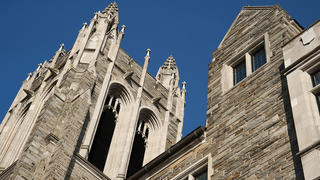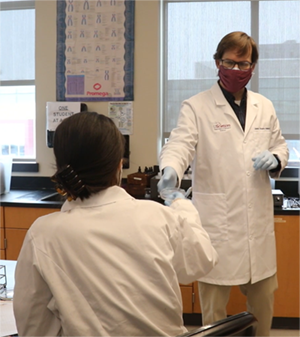Microbiology CURE Lab Gives Undergrads Real Research Experience

Editor's note: This article was written prior to University of the Sciences' merger with and into Saint Joseph's University and does not reflect the current, combined institution. References to programs, offices, colleges, employees, etc., may be historical information.
Through a series of Course-based Undergraduate Research Experiences (CURE), USciences students are able to get hands-on, in the lab research experience beginning in their first year.
Jason Heindl’s, PhD, microbial genetics class is a CURE course where students are working first hand with bacteria and biofilms. “We’re teaching bacterial genetics at the same time that we’re doing real, hypothesis driven research,” he shares.
In this lab specifically, students work with bacteria that are well-known plant pathogens to see how they move within the environment, a process known as swimming motility, and how this process is regulated. This motility is often integrated with surface attachment or biofilm formation. Understanding how bacteria move can help scientists to better understand and treat infections that may be antibiotic resistant.
 “This lab is super interactive and fun,” shares Gianna Calligy BMS’23. “You perform a lot of [the research] yourself as opposed to the instructor doing it, and you really are getting research experience while also having a lot of guidance from your instructor.”
“This lab is super interactive and fun,” shares Gianna Calligy BMS’23. “You perform a lot of [the research] yourself as opposed to the instructor doing it, and you really are getting research experience while also having a lot of guidance from your instructor.”
In addition to actively doing research CURE courses are a chance for students to hone their basic lab skills as well, such as pipetting and analyzing scientific literature.
“It’s really giving me these tools that I can use ad skills that you develop yourself that will really help you grow as a student, and skills that you will actually need to apply. It also gives you a better foundation of what you’re learning in your microbiology classes, and that helps you really see how it’s applied,” Calligy said.
To a student considering working in this lab, Dr. Heindl encourages that they reach out!
“There are a number of opportunities either in the individual research labs or through these CURE courses.” explains Dr. Heindl. “There are several CURE courses available. If you want to really learn how to do and think about science, this is a great way to do it.”
Calligy, who plans to move onto medical school after her time at USciences, recognizes the importance of being able to do research and develop her skills so early in her academic career.
"The CURE experiences are very fun"
Gianna Galligy BMS'23
“The CURE experiences are very fun. They may seem intimidating at first, but once you get there, there is a lot of support,” she said. “You will feel much more confident and independent in your lab skills, and you will definitely come away with a better understanding of your course materials.”
